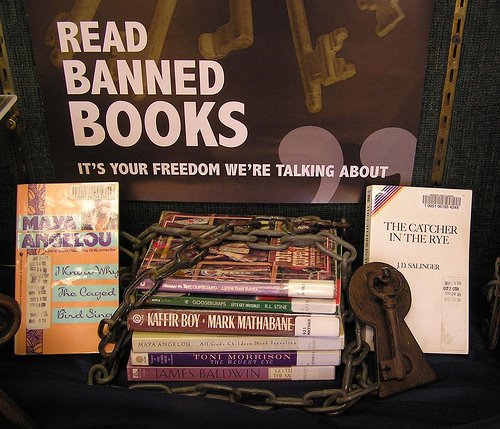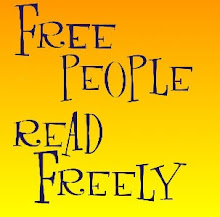
Author: Salman Rushdie
Year of Publication: 1988
Awards: Booker Prize finalist, winner of the Whitbread Award for novel of the year
Of The Controvorsy and The Banning
I am starting with The Satanic Verses because it's the grand-daddy of all banned books in recent history and it because it was the first book that helped create my own consciousness of the consequence of words, the power of writing, and the storms they can create. Most of us know the controvorsy but I'll do a quick recap.
After its publication in 1988, The Satanic Verses, had mixed reviews but, in the Muslim world was almost universally hated. It was considered blasphemy, the stricted Islamic interpretation of which is death. Not only was it blasphemous to the Prophet of Islamic it also had a caricature pious religious leader who lived in the West while alerting his eyes from its fleshpots. Sounds familiar? Obviously it hit close to the Ayatollah Ruhollah Khomeini, the Supreme Leader of Iran, because he issued a fatwa demanding the death of the infidel author, and anyone who had anything to do with the book. The fatwa challenged all true Muslims to take on the onus of responsibility.
The storm broke and Rushdie went underground.
Copies of the book were burned world-wide, and India was one of the first countries to ban the book. I remember outraged scholars--including prominent Muslim ones like Irfan Habib--protesting the ban. Obviously India was not the only one to ban The Satanic Verses. Many countries did.

Rushdie remained in hiding and was protected by constantly moving and being granted police protection by the British government. Others involved with the book were not so lucky. The Japanese translator was kiled in 1991, the Italian translator was stabbed to death, both in 1991. The Norwegian publisher, William Nygaard barely survived an assassination attempt in 1993. The Turkish language translator was the intended target for the Sivas massacre in July 1993 that claimed the lives of 37 people.
While Rushdie has gradually emerged from hiding, becoming more visible in the intervening years, especially after Khomeini's death, the fatwa remains active because it could only have been rescinded by the original issuer of it. Technically Rushdie still is fair game for anyone who wants to take him out.
The Review
It is for these reasons and many more that I chose The Satanic Verses to be the first book to be reviewed on this blog. My passion for free speech and my love of reading and writing coalesced during those late years of the 1980's. I had first read the book during that time but understood not much at all. So I re-read it recently, and so here we are.
The Satanic Verses is a book that challanges the reader. From its frame narrative approach and its magical realism to the heavy doses of Hindi and Urdu words to the shifting plot that takes us through time, place, and varying levels of consciousness some might find it a hard book to read.
I was enchanted. The language is Rushdie at his best. It is at once exuberant, lively, and mischievous while bringing emotional core truths to the surface.
We start with Gibreel Farishta (part Amitabh Bacchan, part NTR all Bollywood movie star) and Saladin Chamcha (the man of a thousand voices) hurtling through the sky after the airplane Bostan on which they were traveling was hijacked and blown up. They are the only two survivors and wash up on a snowy English beach.
What struck me was how timely this book is because it examines universal themes. Substitute the Khalistani separatist terrorist hijackers with the terrorists of today and the rest of the story remains relatable. Yes, relatable, despite its fantastical, magical-realism. Because Rushdie, above all, looks at the human condition.
Whether it is the relationship between father and son, failed love affairs or dislocation and the life of the other in Western societies, The Satanic Verses is as relevant today as it ever was.
The cast of characters is immense, moving through time and space effortlessly. The boundaries between dreams, visions, revelations, madness, reality, time and space are fluid and unpredictable, and managing these shifting lines requires a masterful hand. Rushdie handles these alternate realities with almost magical ease, while never letting us forget the real life, real people and real situations that ground the book. It is ultimately a book about life, death, love, dislocation, colonialism, post-colonialism, immigration, self-hatred, acceptance, fear...all the shades of life and living even as we go from seventh century Jahilia to 20th century London and places in between. That is what separates Rushdie from run of the mill writer.
It is one of these time-shifts that landed Rushdie in trouble. We are transported to Jahilia, a city made out of sand, on which a drop of water would wreak devastating havoc. The age of jahalat, of course (literally illiterate and ignorant) was the name given to the phase of time before Islam arrived in Arabia. The time before Allah when one of the most powerful deities was the female god Al-lat.
And, living the life of an outcast is the prophet...not Mohammad, but Mahound, the derogatory name given to the prophet of Islam by the British. "Here he is neither Mahomet nor MoeHammered; has adopted, instead, the demon-tag the firangis hung around his neck. To turn insults into strengths, whigs, tories, Blacks all chose to wear with pride the names they were given in scorn..."
Just as in The Last Temptation of Christ imagined Christ betrayed himself, by choosing to believe the temptations of Satan, so does Mahound betray his own principles by listening to the satan verses he says were given to him by Gibreel. These are in fact the disputed verses from the Quran that some critics say were self-serving and expedient rather than divine. This section, as well as the scenes in the brothel where the prostitutes take on the names of the prophet's wives to service the sexual fantasies of the newly converted Meccans were the most incendiary to Muslims. And, in a curious foreshadowing of the controvorsy to come, note this exchange when Mahound sentences to death the poet Baal:
"So he was sentenced to be beheaded, within the hour, and as soldiers manhandled him out of the tent towards the killing ground, he shouted over his shoulder: "Whores and writers, Mahound. We are the people you can't forgive."
Mahound replied, "Writers and whores. I see no difference here."
But there are other satanic verses too, not just semi-divine ones. As Gibreel Farishta teeters on the edge of insanity, fueled by his jealous love for Alleluia Cone the flat-footed mountain climber, he receives sinister phone calls. The caller recites sometimes filthy, sometimes nonsensical verses about having sex with Cone. This plunges Gibreel over the cliff, leading to the final showdown.
The language is sublime but for those who don't know hindi, Indian cinema, Islam and Islamic history, and a smattering of Arabic it can be rather bewildering. Rushdie does not translate...there are no footnotes, no elaborate explanations. Rushdie is primarily a proud post-colonial writer. This helps maintains the flow of the story, allowing readers to revel in his inventive and clever and totally masterful use of the English language. For the more curious literate reader it affords opportunity for research. I can, however, see that at times Rushdie can come across as self-consciously clever and even smug. If you can overcome that read this book if you haven't or re-read it if it has been a while.
The Satanic Verses is a tour de force, a book by Rushdie at his peak, sadly overshadowed by the controvorsy and violence surrounding it.
Keep a few days aside to read it. It is not an easy read, but a rewarding one. It is multi-layered, multi-textured, complex and surprising. The plot, the structure, the characters are all secondary to the story-telling. The author's hand is invisible, but intriguingly his personality comes through. The book is indelibly Rushdian and one that should be read.
Read, not only as a protest against censorship and violence but also because The Satanic Verses is a wonderfully written book by one of the greatest living writers. Yes, I sound a bit of a fan-girl here, but I'd rather be a Rushdie fan-girl than a groupie for any other contemporary author.
And this is another reason I chose Rushdie and The Satanic Verses as the kick-off review for this blog.



